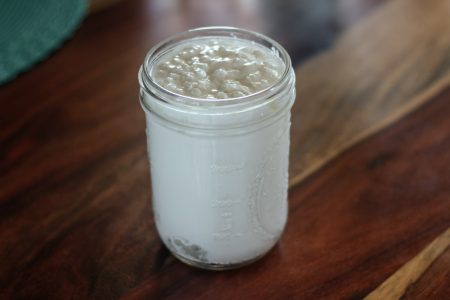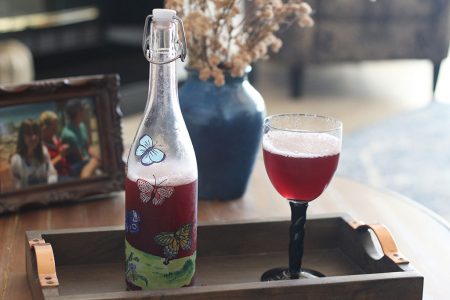
Fermented Foods and IBS
IBS and Gut Bacteria
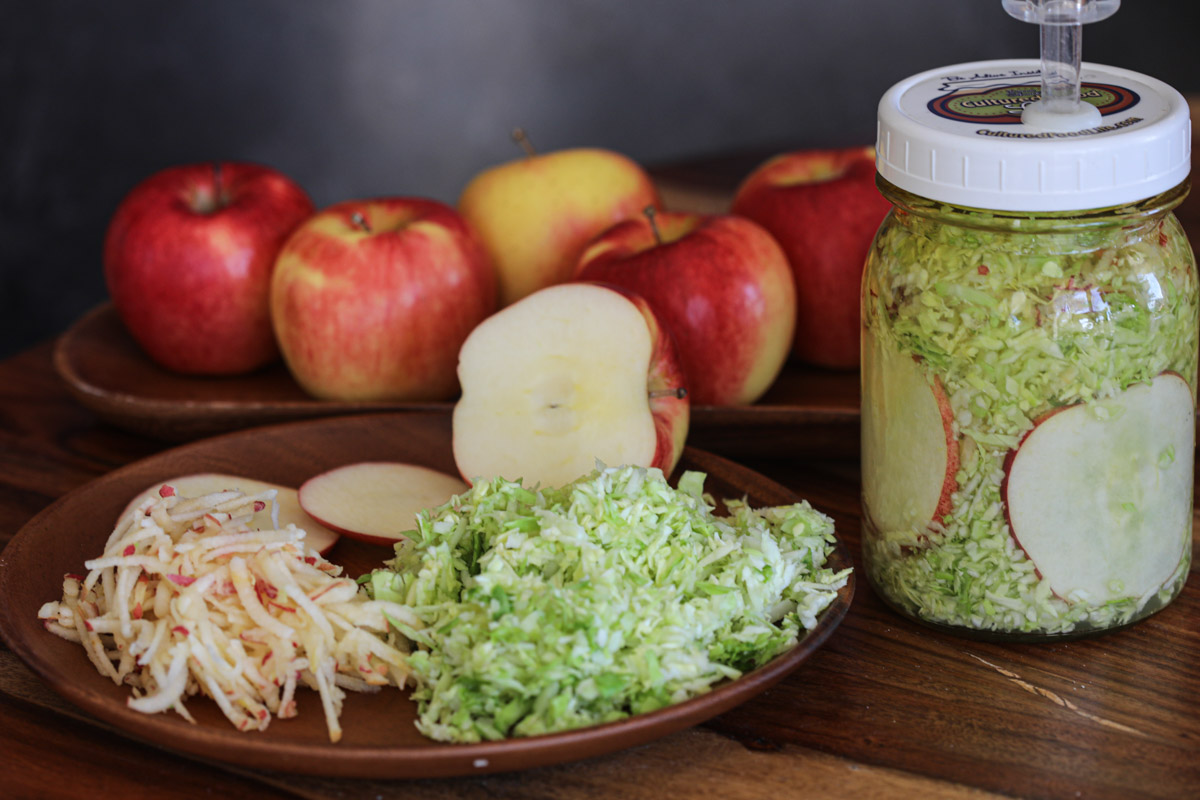
Irritable bowel syndrome (IBS) is usually identified by a group of symptoms: abdominal pain, bloating, and a change in bowels that can alternate between diarrhea and constipation. My daughter's story of healing from IBS was one that made me a believer in the power of probiotic foods. She had multiple food allergies and IBS, and by having cultured foods and prebiotics at every meal she healed her gut and IBS. That was over twenty-three years ago (check out the story here).
So what do scientists say about the connection between probiotics, a healthy gut, and IBS? One 2014 study looked at 28 people suffering from IBS.1 Some of the participants were asked to consume a fermented milk product for four weeks while others served as a control group. In those people consuming the drink, researchers saw an increase in the bacteria that produce butyrate, an acid that is beneficial for gut health. In response, the symptoms of their IBS also improved, while the symptoms of the people in the control group remained. The conclusions drawn in this study mirror those of a study done in 2009 with 34 participants.2
Another study, done in Norway, compared three groups: two composed of people who were suffering from IBS and one with subjects who had no symptoms of IBS. One of the IBS groups was given dietary advice, and the other two groups didn’t receive this advice. Many people who have IBS avoid dairy because it causes their symptoms to flare up. The people in the IBS group who got advice were told to consume fermented milk products containing probiotics. Interestingly, the people who consumed the most fermented dairy did significantly better than their counterparts. They reported an improvement in their quality of life and a reduction of abdominal pain.3
How My Daughter Healed Her IBS
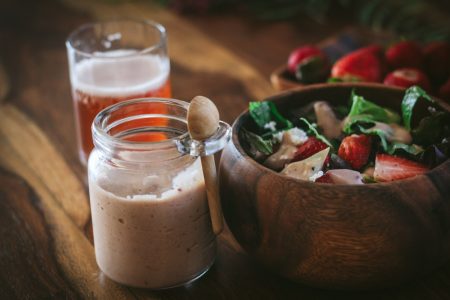
First, her gut lining was damaged. Years of antibiotics had stripped her of all her good bacteria. Stress, certain foods she was eating, and a lack of nutrient-dense foods were destroying her gut lining. The lack of proper bacteria to turn her foods into vitamins and fatty acids was causing changes in her gut. There was nothing to protect her gut lining. She had been on an extremely low carb diet for several years, and her microbes were in dire need of fiber in the form of prebiotic carbohydrates such as fruits, vegetables, nuts, seeds, and grains to thrive and grow. She was only eating 30 carbs a day, essentially starving her microbes and was taking antibiotics. When your microbes don't have any food, this can cause the pH in your gut to shift. This shift can favor the growth of less healthy, negative endotoxin-producing gut bacteria such as Bacteroides, and reduce the growth of positive bacteria that are “more healthy” for your gut.
The American Gut project states, "As pH shifts, prospects for opportunistic pathogens increase, as do opportunities for gram-negative bacteria like Bacteroides and Enterobacter. When you add this up – and a lot more shifts in the microbial ecology of the low-carb gut – you most certainly have a classic case of microbial dysbiosis – as the name implies, an imbalance. This dysbiosis can lead to issues associated with Inflammatory Bowel Disease, autoimmune disease, metabolic disorders, and so on." This now makes sense to me since it was the perfect storm - she was a perfectly normal teenager with no food allergies, and suddenly she developed all kinds of symptoms and food allergies she'd never had before. Antibiotics had stripped her of all her good bacteria and left her defenseless. This, along with starving her microbiome with a lack of fiber to feed her microbes, was changing the world within and causing great pain and symptoms that changed the course of her life. We also found that just eliminating the offending foods will eliminate the pain to a degree. but then you need to fix the microbiome to re-establish a new inner microbiome.
Developing Food Allergies After Antibiotics
Recently, researchers at New York University Medical Center made some exciting discoveries regarding food allergies and intestinal bacteria. Not only did they discover why many
children develop food allergies, but they also found a way to solve it. The study, which was published in the Proceedings of the National Academy of Sciences, found that young children who were given too many antibiotics early on were at greater risk of developing food allergies. The researchers identified naturally occurring bacteria in the human gut that keep people from developing food allergies; if these bacteria were killed by antibiotics early in life, children became more susceptible to food allergies later on.[4]
The scientists tested this theory by feeding antibiotics to young mice and found they were more likely to develop a peanut sensitivity than the control group. When the young mice were then given the good bacterium Clostridia (a diverse group of bacteria), like magic their allergic reactions vanished. Many more studies are confirming the same thing. For years I didn’t know why Maci began to heal when she started having cultured foods at every meal. It was working so well that my friends noticed and then their kids began to heal, too. Fast forward years later, science caught up and explained to me what was behind the magic in these cultured foods.
FODMAP and IBS
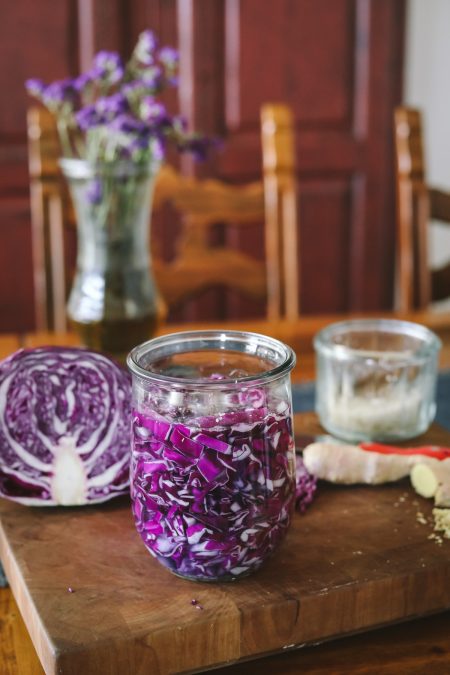
Professor Peter Gibson at Monash University in Melbourne developed the FODMAP diet to help alleviate signs of IBS and ease discomfort. When it comes to the FODMAP diet, avoiding a lot of foods that cause symptoms only temporarily removes the problem. It doesn’t heal the problem that caused it to begin with. While this diet does reduce gas, bloating, and cramping, you'll have to avoid a long list of otherwise beneficial foods like fruits, grains, dairy, and veggies forever if you don't fix the underlying problem. New findings by researchers pointed to possible drawbacks: “There may be potential detrimental effects of the diet in the long term, due to potential changes to the gastrointestinal microbiota. . . . Future research should focus on the relevance of changes to the microbiota and ways to liberalize the dietary restrictions.”
FODMAP is an acronym that stands for Fermentable Oligosaccharides, Disaccharides, Monosaccharides, and Polyols. These are the scientific terms used to classify groups of carbohydrates that can sometimes cause gas, bloating, and disruption of digestion in sensitive individuals. Your gut bacteria use these carbs as a food source and produce hydrogen gas. Without the proper gut flora, they can end up fermenting in the intestines, leading to signs of IBS or small intestinal bacterial overgrowth (SIBO).
Your gut is like a rainforest
Think of your gut like a rainforest that contains many thousands of different microbial species, most of them still unknown to us. If it is destroyed or diminished, it needs to rebuild that diversity to thrive again. Adding probiotic-rich cultured foods - such as cultured vegetables and kefir - helps to rebuild that flora but it needs to be done with caution since some of these foods are high on the FODMAP. The same researchers that developed the FODMAP diet emphasize the need to eventually remove restrictions on the diet. This means reintroducing high FODMAP foods while healing the gut. They also emphasize the need to focus on the inner ecosystem of the gut. Think of yourself as a park ranger for your gut. If your gut microbiome is healthy, you’d want to continue to support the beneficial microbes with foods that enhance the flora and inhibit the growth of pathogenic microbes and fungi by limiting their food sources. In this way, you would build the strength of the ecosystem and avoid any major disturbances, like antibiotics or foods and drugs that can harm the balance. If you’re a park ranger of a gut ecosystem that is in need of repair, you’d first want to get as much information about what's going on in your gut to help rebuild and contain the problematic symptoms that are causing you distress. You must ask yourself questions. Has my gut flora been altered with antibiotics or overconsumption of processed foods that harm it? What foods are the species in my gut relying on? How stable is this system? Am I having a lot of bloating, gas, or abdominal pain when I eat? Chances are something is out of whack if you have symptoms and you'll need extra support.
Check out this post for more info on: FODMAP and Cultured Foods
Finding Help to Heal
It is my experience with my daughter and countless others who have had IBS, that adding fermented foods (and a few other things) in certain amounts can help heal the gut and speed you on your way to health. You need to proceed with caution since every individual is different and has different food triggers. My daughter had IBS and terrible food allergies before we started cultured foods. These symptoms are messages from your body. These messages are telling you that the environment within the body is wounded and that it needs repair.
What we did to repair my daughter's gut was to have small amounts of cultured foods at every meal. Foods such as one to two tablespoons of the juice from cultured veggies and lots of soups will tend to ease symptoms. She usually consumed a kefir smoothie for breakfast and a few ounces of kombucha with her meals. You'll have to experiment to see what you can handle, but your gut needs microbes to repair itself. Even if you can only find one cultured food that doesn't trigger you, try to have it every time you eat even if it's just a spoonful. It will help you digest the foods you're eating and also flood your body with much-needed microbes that can heal your gut. Here are the foods and supplements that can help you and the specific amounts I recommend that will rebuild the microbiome. Remember to always listen to your own body because everybody is different. It will be a journey but it will teach you so much and help you to start to believe that wellness is the norm.
Cultured Foods You can Eat
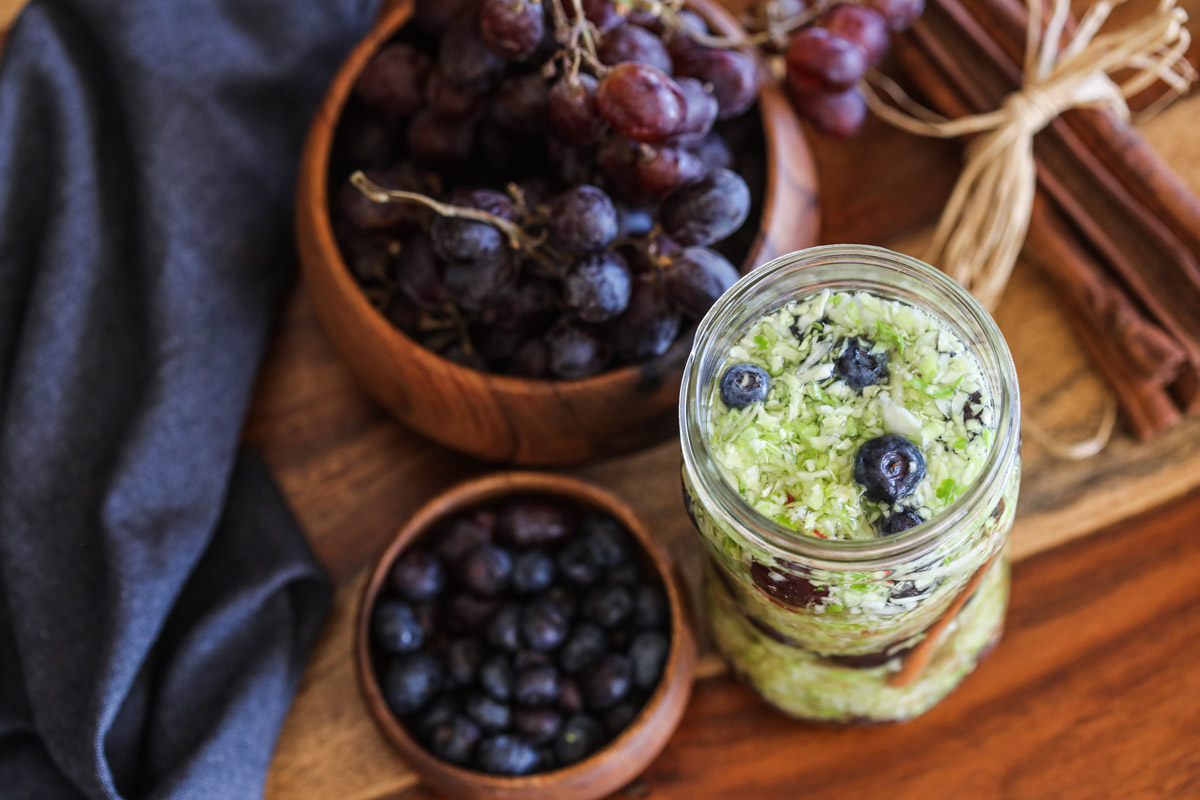
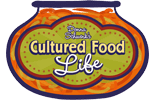
Cultured Kraut
Maci ate lots of fermented cabbage. But those following the FODMAP Diet might want to try purple cultured cabbage. Sauerkraut made from green cabbage is high FODMAP due to the amount of mannitol which is a sugar alcohol. It belongs in the "Polyol" group within the FODMAP acronym. However, red cabbage that is fermented is low to moderate on the FODMAP diet. Different cabbages have different carbohydrate compositions and can ferment in different ways. The red cabbage kraut might be better tolerated. One spoonful with a meal would be the recommended amount to start with to see how your body responds. Fresh ginger has been given a Green Light by Monash University and I love to add it to cultured veggies.
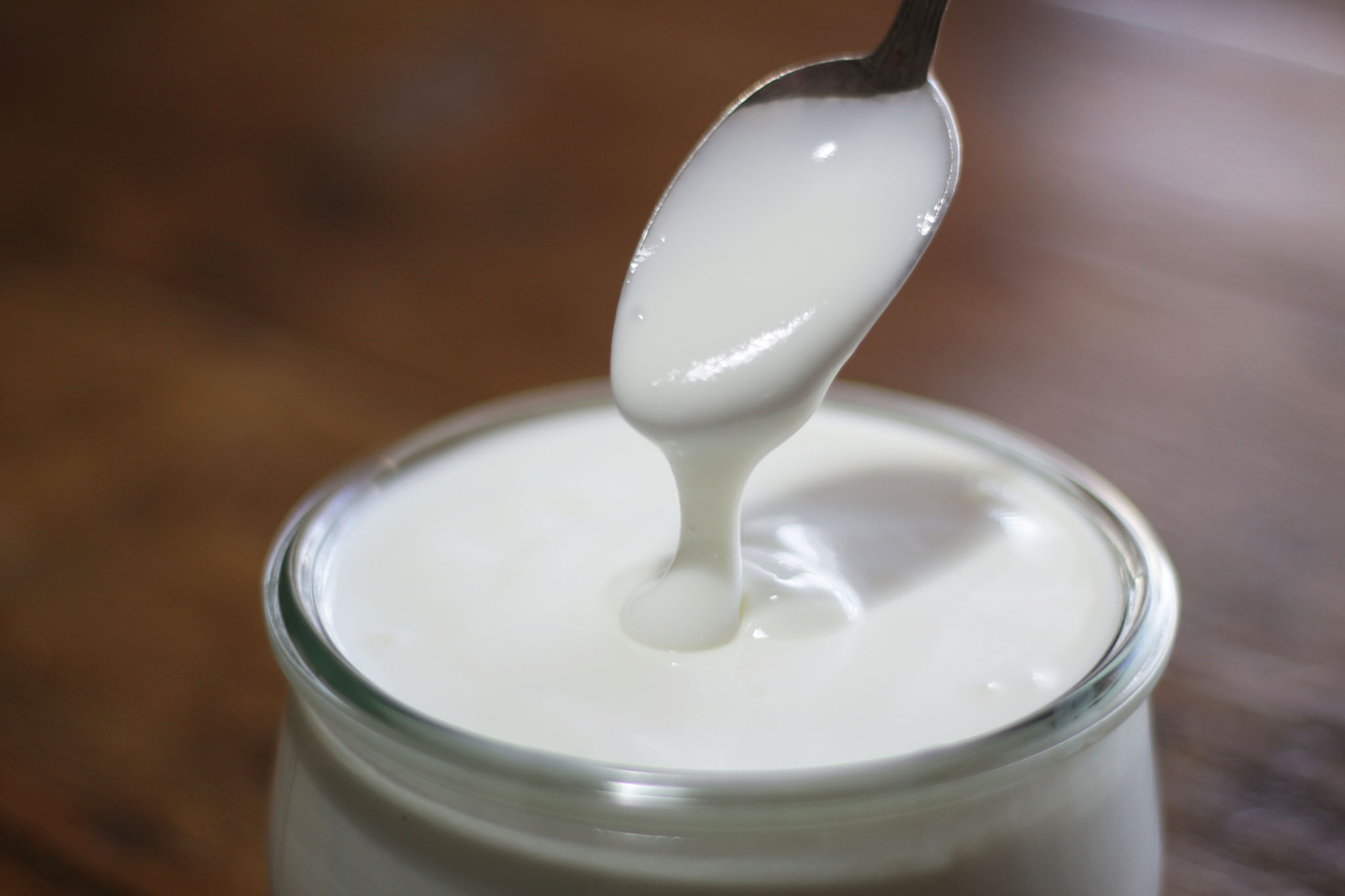
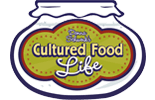
Kefir
Kefir contains over fifty probiotic species of good bacteria and yeasts, and it is 99.9% lactose-free. This was something we religiously had every day when trying to heal IBS. Lactose is high on the FODMAP for disaccharides; but since fermentation removes most of the lactose, it might be a good probiotic-rich food to add to your diet. Goats milk kefir is low on the FODMAP diet and loaded with many health benefits. There is a protein in most cow milk called Alpha1 casein that many individuals are allergic to. Not all cows produce this A1 casein. The milk from A2 cows produces none of these inflammatory effects that A1 casein does. Goat milk primarily contains only A2 casein making it, protein-wise, the closest milk to human breast milk.
Another alternative is coconut kefir which is low FODMAP and gives you lots of probiotics as well. Always start with a few spoonfuls at a meal to see how you do. You can have more if you don't have reactions. Having a cultured food at every meal will help you rebuild your microflora which will allow easier digestion of the foods you eat with it.

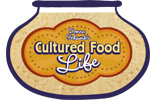
Sourdough Bread
According to Monash University, the levels of fructans in sourdough bread are reduced during the sourdough fermentation process This is because the yeasts ferment the fructans during the natural leavening process while the bread rises. Typically the dough should be allowed to rise for around 12 hours. If you make my sourdough bread, you'll find this to be the perfect fermentation time. My daughter did very well on sourdough bread when she had IBS, but did not do well with other types of bread that were not fermented. She had a couple of slices a day, but always start with a small amount and see how you do. Then you can add more as you heal. Having an ancient grain sourdough bread such as Spelt or Einkorn bread would further help your digestion since the gluten in spelt and einkorn has a different molecular make-up than the gluten in modern wheat. It is more fragile and more water-soluble, which makes it easier to digest.

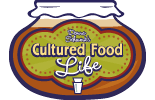
Kombucha
The probiotic in kombucha, S. boulardii, is actually being used to treat all sorts of bowel disorders including Clostridium difficile, acute diarrhea, antibiotic-associated diarrhea, some parasitic forms of diarrhea, and other gastrointestinal disorders. It also has a record of helping reduce the symptoms of irritable bowel syndrome (IBS).[6]
Many people (including my daughter) have found kombucha to be of great help with IBS symptoms. Having four to six ounces with a meal would be ideal. A full serving of kombucha might not be suitable for those who do not tolerate fructans. No two people are alike and our microbiome is like a fingerprint. This is a great way to listen to your body and allow the healing to come with much wisdom and experience by understanding what your body needs in order to help itself find the perfect balance. I think that drinking plain kombucha is best, but you can experiment and see if fruit-flavored kombucha works for you, too.
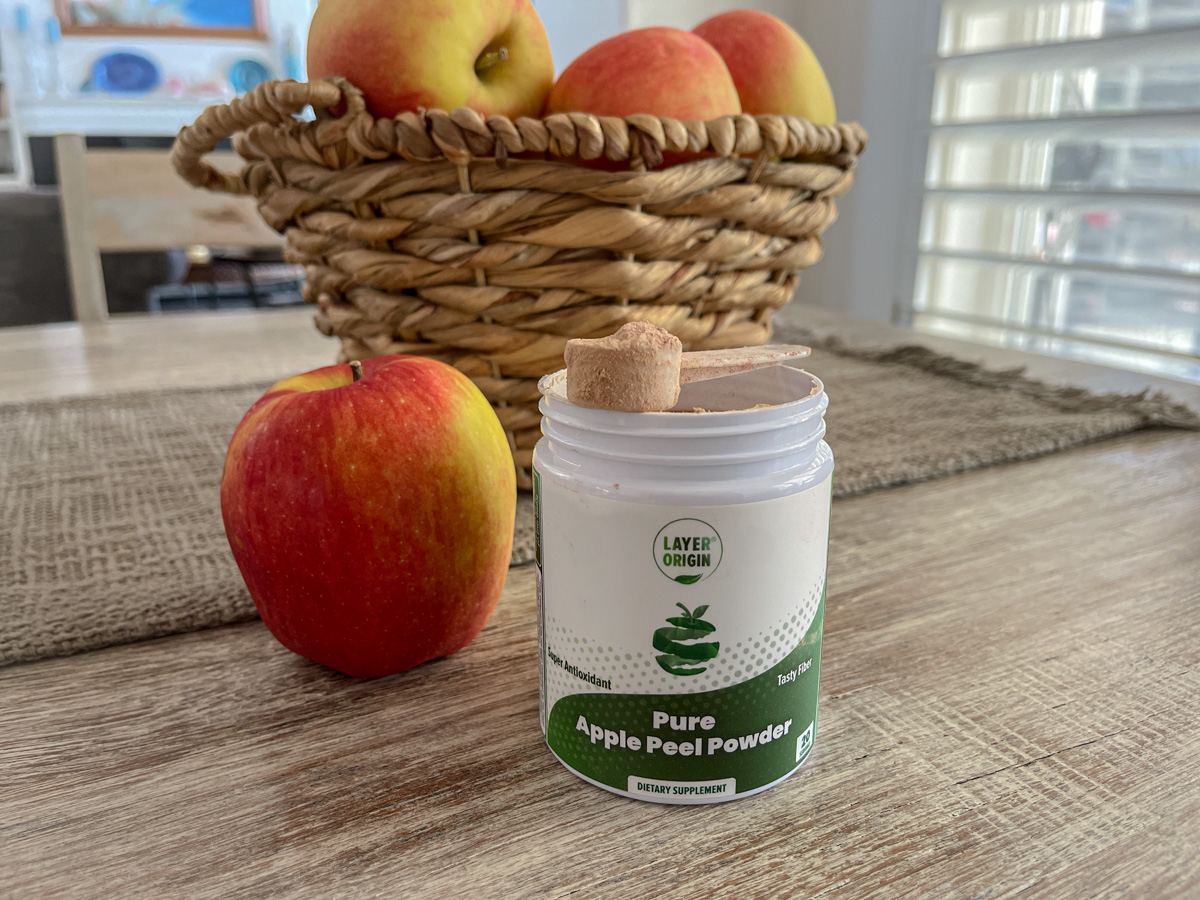
Apples and Apple Peel Powder
Help for our Gut Lining
Akkermansia muciniphila is a specific bacteria in our gut that helps to maintain our gut lining and has many health benefits. Our gut lining keeps us protected from the outside world. When it's damaged you can have leaky gut syndrome, IBS, anxiety, fibromyalgia, and chronic fatigue syndrome just to name a few. Apple Peels or Apple Peel powder is the perfect food for Akkermansia Muciniphila: it feeds this super probiotic, which helps to strengthen gut barriers in a powerful way. Foods can be powerful medicine and apples can keep your gut and microbes thriving.
Check out these links
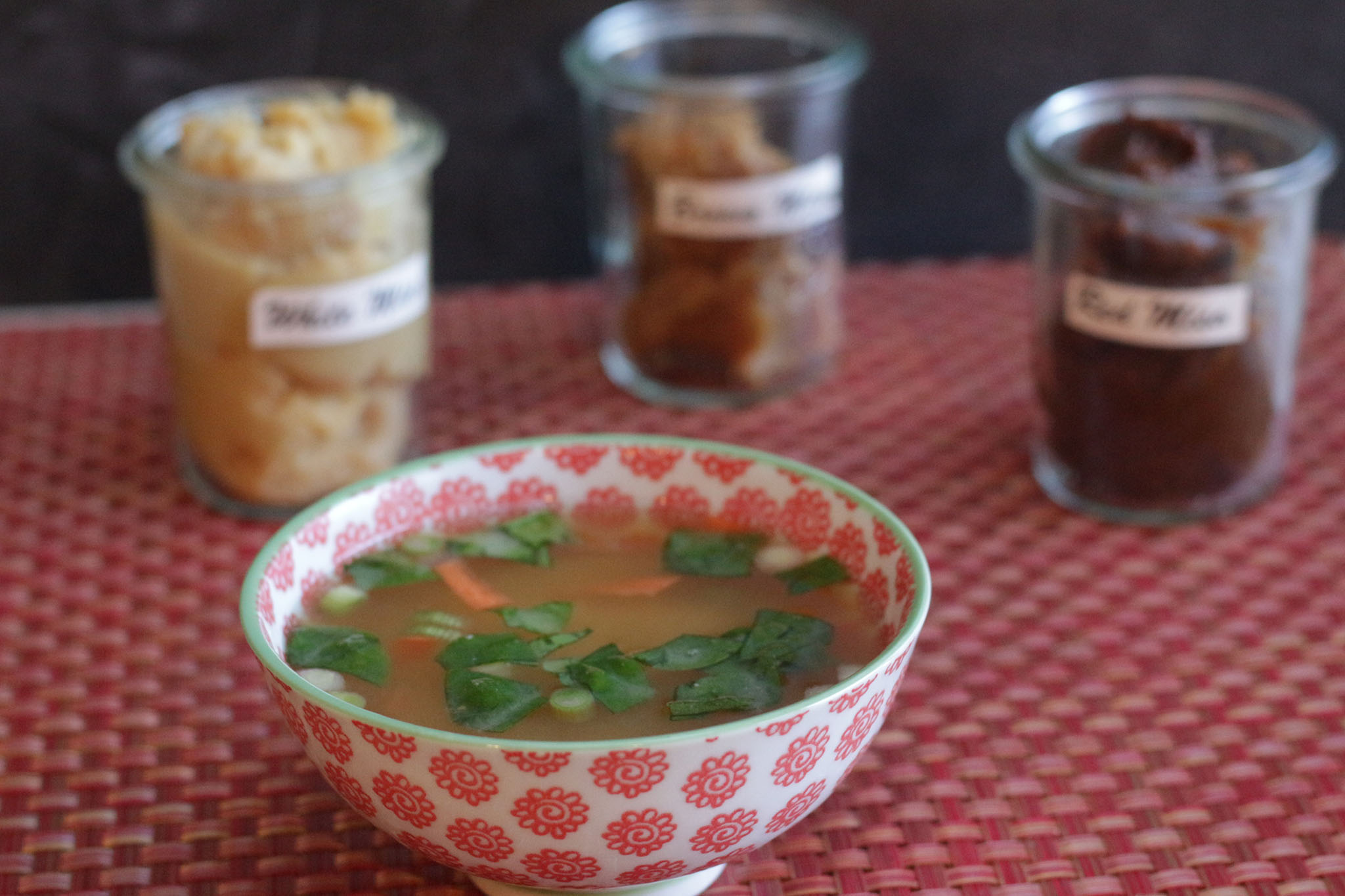
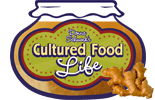
Miso
Miso is a fermented soy food that is loaded with enzymes and microbes. There are so many microbes in miso that scientists haven't isolated them all yet. During the fermentation process, You'll get a load of B vitamins in miso, which is likely increased from the lactic acid bacteria. This will help boost your immune system and strengthen your microbiome and give you delicious food to consume as often as you'd like. Miso can keep for months on end in your refrigerator and just a spoonful will do to make a soup or other recipes that will encourage your microbes to grow and thrive.
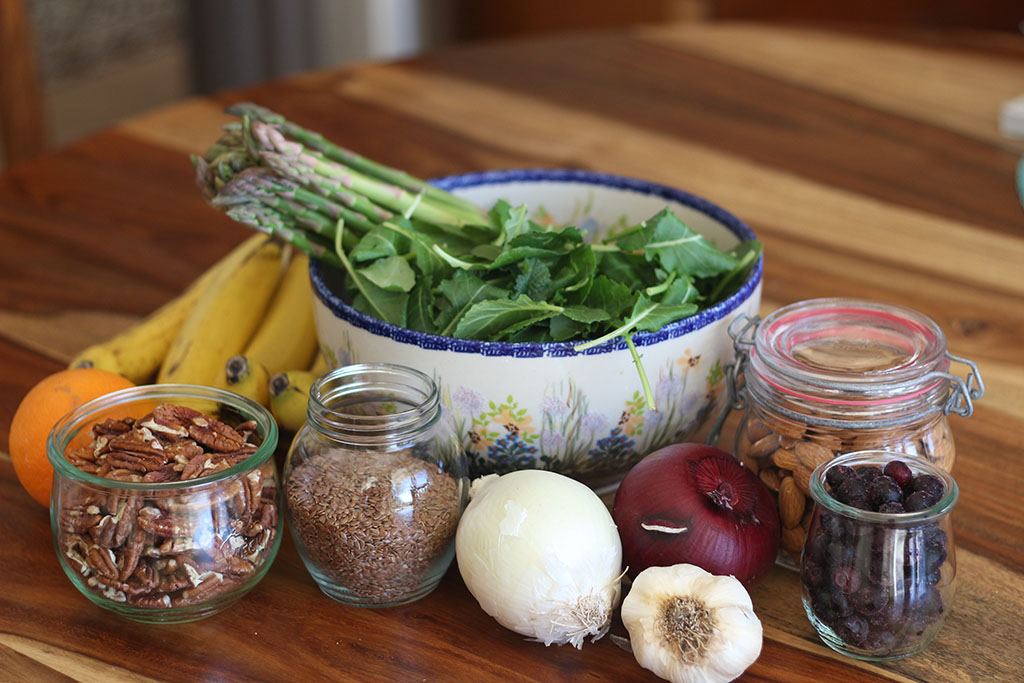
Prebiotics
Maci began drinking a tea that she said soothed her gut. She drank this every day, sometimes several times daily. I later realized this special drink actually had many prebiotics (food for bacteria) in it which were feeding the good bacteria in her gut. The combination of cultured foods consumed with every meal along with this prebiotic made her gut heal and her food allergies and IBS became a thing of the past. 🍎🥦 Prebiotics are super important in the form of veggies, fruits, prebiotic teas, or supplements. Check out this link for more prebiotics.
Listen To My Podcast
Keeping your gut lining intact is one of the most important things you will do. More and more people are experiencing leaky gut syndrome with dire consequences. Learn things you can do to help keep your gut lining intact and heal IBS.
References:
“Impact of Gut Microbiota of Fermented Milk Product Containing Probiotics Revealed by New Technology,” Science Daily (September 11, 2014): www.sciencedaily.com/releases/2014/09/140911125045.htm.
- A. Agrawal et al., “Clinical Trial: The Effects of a Fermented Milk Product Containing Bifidobacterium lactis DN-173 010 on Abdominal Distension and Gastrointestinal Transit in Irritable Bowel Syndrome with Constipation,” Alimentary Pharmacology and Therapeutics 29, no.1 (January 2009): 104-14: abstract at www.ncbi.nlm.nih.gov/pubmed/18801055.
- H. Østgaard et al., “Diet and Effects of Diet Management on Quality of Life and Symptoms in Patients with Irritable Bowel Syndrome,” Molecular Medicine Reports 5, no. 6 (June 2012): 1382–90: www.spandidos-publications.com/10.3892/mmr.2012.843.
- Andrew T. Stefka et al., “Commensal Bacteria Protect Against Food Allergen Sensitization,” Proceedings of the National Academy of Sciences 111, no. 36 (September 9, 2014): 13145–13150
- C.H. Choi et al., “A Randomized, Double-blind, Placebo-controlled Multicenter Trial of Saccharomyces boulardii in Irritable Bowel Syndrome: Effect on Quality of Life,” Journal of Clinical Gastroenterology 45, no. 8 (September 2011): 679–83: abstract at https://www.ncbi.nlm.nih.gov/pubmed/21301358; S. Uhlen, F. Toursel, and F. Gottrand, Association Française de Pédiatrie Ambulatoire, “Treatment of Acute Diarrhea: Prescription Patterns by Private Practice Pediatricians,” Archives de Pédiatrie 11, no. 8 (August 2004): 903–7: abstract at http://www.ncbi.nlm.nih.gov/pubmed/15288079.
Are you on the list?
Sign up today and I'll send you my free Getting Started Guide!
Each week I'll send you updates, tips, recipes, and more! You might even be a winner of my weekly giveaway! (starter cultures, memberships, and more!)
Come be a part of my cultured food family!

